PGBM136 Contemporary International HRM: Tesco's Case Study Analysis
VerifiedAdded on 2020/11/23
|12
|3588
|437
Report
AI Summary
This report provides a detailed analysis of Tesco's international human resource management (IHRM) practices, focusing on recruitment, selection, and expatriate failure. It begins with an introduction to IHRM and the role of Tesco as a multinational organization, highlighting its global operations and the importance of effective HR strategies. The report then delves into Tesco's recruitment and selection processes at the international level, exploring various approaches such as ethnocentric, polycentric, geocentric, and regiocentric methods. It discusses the reasons behind international operations and the factors influencing employees' decisions to work abroad. The report also examines the selection of expatriates, including the criteria considered by Tesco, such as technical skills, cross-cultural suitability, family requirements, and organizational needs. It further explores the techniques used for selecting expatriates and the process of repatriation. A significant portion of the report is dedicated to expatriate failure, outlining its causes and the associated costs for Tesco. Finally, the report concludes with recommendations for mitigating expatriate failure and improving overall IHRM effectiveness.
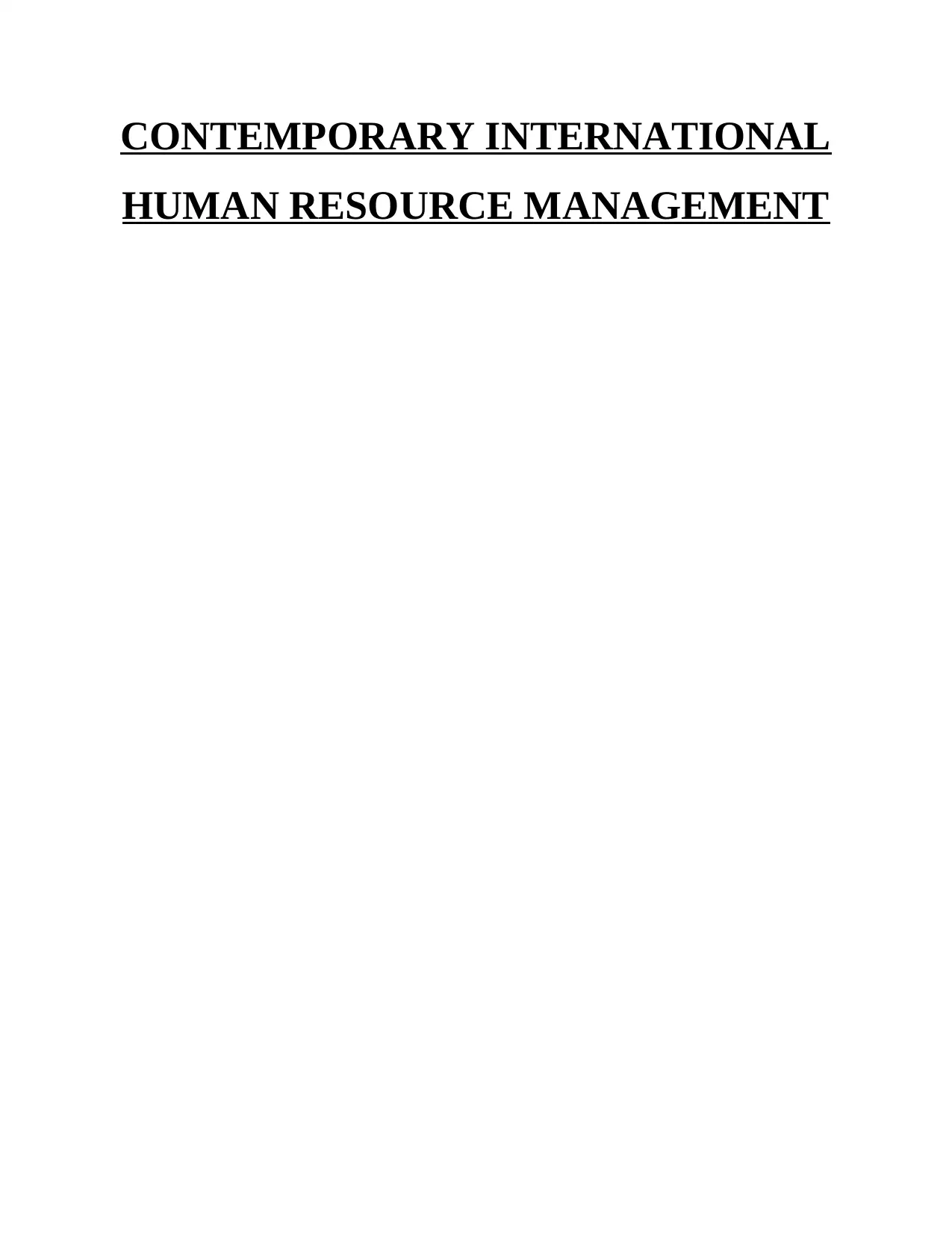
CONTEMPORARY INTERNATIONAL
HUMAN RESOURCE MANAGEMENT
HUMAN RESOURCE MANAGEMENT
Paraphrase This Document
Need a fresh take? Get an instant paraphrase of this document with our AI Paraphraser
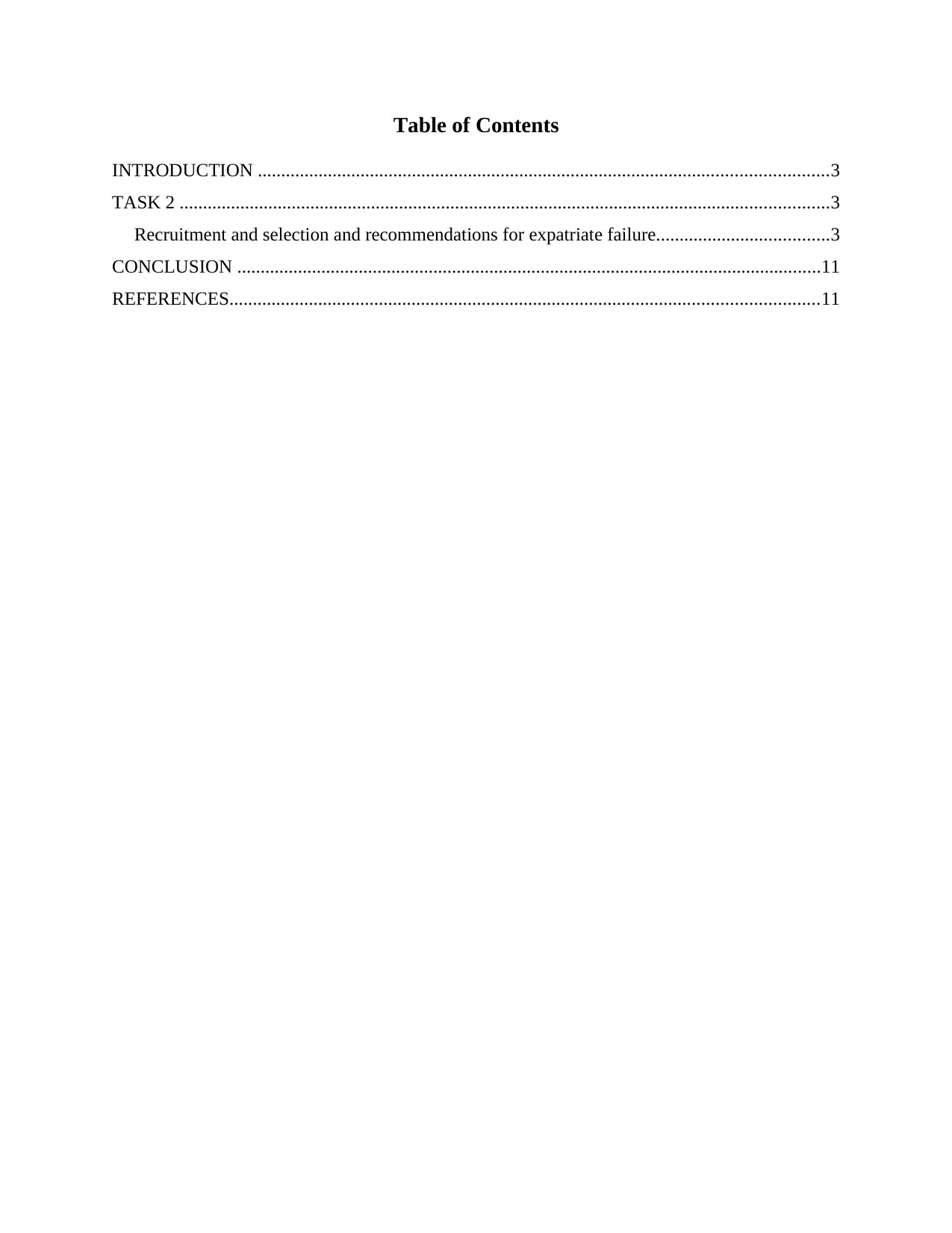
Table of Contents
INTRODUCTION ..........................................................................................................................3
TASK 2 ...........................................................................................................................................3
Recruitment and selection and recommendations for expatriate failure.....................................3
CONCLUSION .............................................................................................................................11
REFERENCES..............................................................................................................................11
INTRODUCTION ..........................................................................................................................3
TASK 2 ...........................................................................................................................................3
Recruitment and selection and recommendations for expatriate failure.....................................3
CONCLUSION .............................................................................................................................11
REFERENCES..............................................................................................................................11
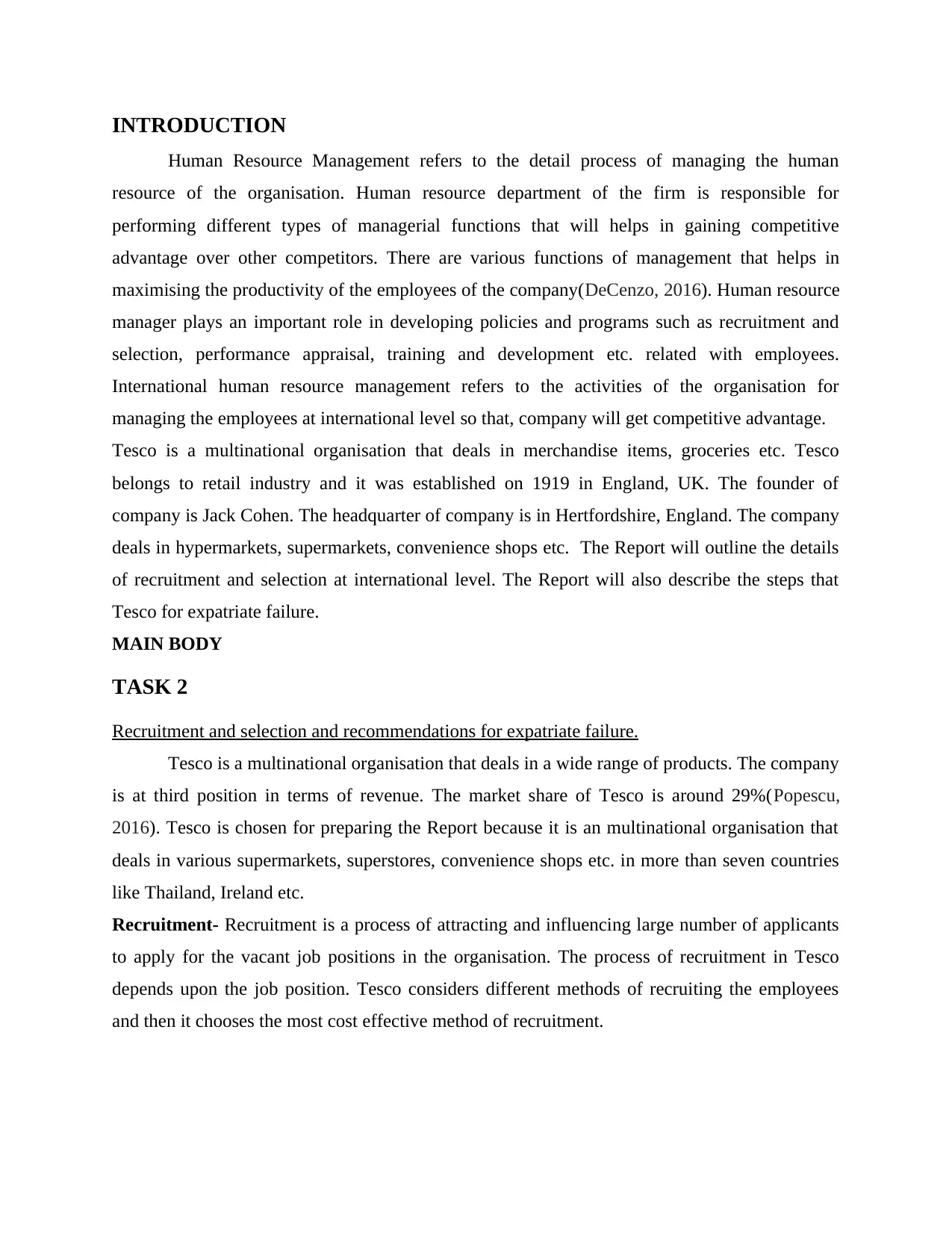
INTRODUCTION
Human Resource Management refers to the detail process of managing the human
resource of the organisation. Human resource department of the firm is responsible for
performing different types of managerial functions that will helps in gaining competitive
advantage over other competitors. There are various functions of management that helps in
maximising the productivity of the employees of the company(DeCenzo, 2016). Human resource
manager plays an important role in developing policies and programs such as recruitment and
selection, performance appraisal, training and development etc. related with employees.
International human resource management refers to the activities of the organisation for
managing the employees at international level so that, company will get competitive advantage.
Tesco is a multinational organisation that deals in merchandise items, groceries etc. Tesco
belongs to retail industry and it was established on 1919 in England, UK. The founder of
company is Jack Cohen. The headquarter of company is in Hertfordshire, England. The company
deals in hypermarkets, supermarkets, convenience shops etc. The Report will outline the details
of recruitment and selection at international level. The Report will also describe the steps that
Tesco for expatriate failure.
MAIN BODY
TASK 2
Recruitment and selection and recommendations for expatriate failure.
Tesco is a multinational organisation that deals in a wide range of products. The company
is at third position in terms of revenue. The market share of Tesco is around 29%(Popescu,
2016). Tesco is chosen for preparing the Report because it is an multinational organisation that
deals in various supermarkets, superstores, convenience shops etc. in more than seven countries
like Thailand, Ireland etc.
Recruitment- Recruitment is a process of attracting and influencing large number of applicants
to apply for the vacant job positions in the organisation. The process of recruitment in Tesco
depends upon the job position. Tesco considers different methods of recruiting the employees
and then it chooses the most cost effective method of recruitment.
Human Resource Management refers to the detail process of managing the human
resource of the organisation. Human resource department of the firm is responsible for
performing different types of managerial functions that will helps in gaining competitive
advantage over other competitors. There are various functions of management that helps in
maximising the productivity of the employees of the company(DeCenzo, 2016). Human resource
manager plays an important role in developing policies and programs such as recruitment and
selection, performance appraisal, training and development etc. related with employees.
International human resource management refers to the activities of the organisation for
managing the employees at international level so that, company will get competitive advantage.
Tesco is a multinational organisation that deals in merchandise items, groceries etc. Tesco
belongs to retail industry and it was established on 1919 in England, UK. The founder of
company is Jack Cohen. The headquarter of company is in Hertfordshire, England. The company
deals in hypermarkets, supermarkets, convenience shops etc. The Report will outline the details
of recruitment and selection at international level. The Report will also describe the steps that
Tesco for expatriate failure.
MAIN BODY
TASK 2
Recruitment and selection and recommendations for expatriate failure.
Tesco is a multinational organisation that deals in a wide range of products. The company
is at third position in terms of revenue. The market share of Tesco is around 29%(Popescu,
2016). Tesco is chosen for preparing the Report because it is an multinational organisation that
deals in various supermarkets, superstores, convenience shops etc. in more than seven countries
like Thailand, Ireland etc.
Recruitment- Recruitment is a process of attracting and influencing large number of applicants
to apply for the vacant job positions in the organisation. The process of recruitment in Tesco
depends upon the job position. Tesco considers different methods of recruiting the employees
and then it chooses the most cost effective method of recruitment.
⊘ This is a preview!⊘
Do you want full access?
Subscribe today to unlock all pages.

Trusted by 1+ million students worldwide
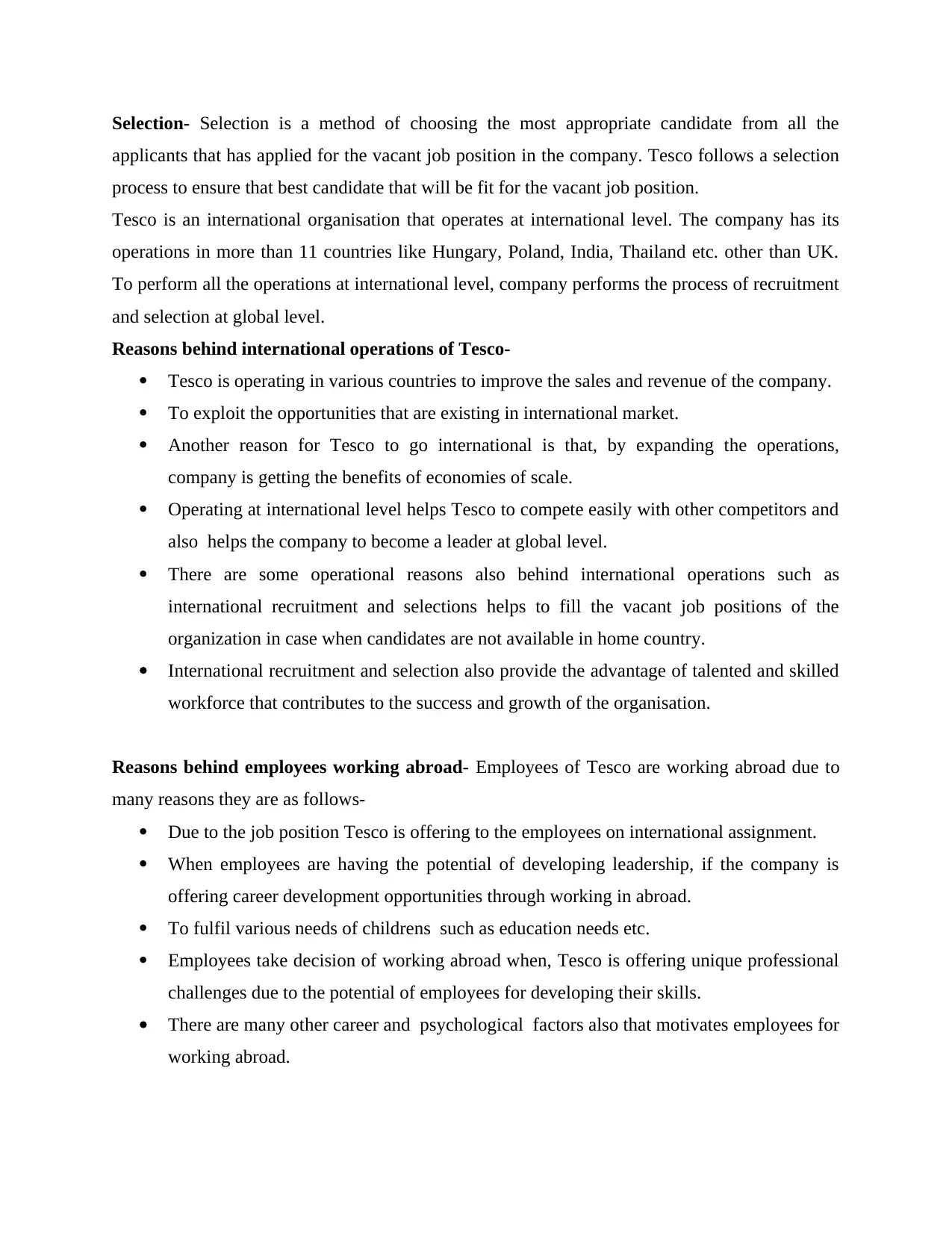
Selection- Selection is a method of choosing the most appropriate candidate from all the
applicants that has applied for the vacant job position in the company. Tesco follows a selection
process to ensure that best candidate that will be fit for the vacant job position.
Tesco is an international organisation that operates at international level. The company has its
operations in more than 11 countries like Hungary, Poland, India, Thailand etc. other than UK.
To perform all the operations at international level, company performs the process of recruitment
and selection at global level.
Reasons behind international operations of Tesco-
Tesco is operating in various countries to improve the sales and revenue of the company.
To exploit the opportunities that are existing in international market.
Another reason for Tesco to go international is that, by expanding the operations,
company is getting the benefits of economies of scale.
Operating at international level helps Tesco to compete easily with other competitors and
also helps the company to become a leader at global level.
There are some operational reasons also behind international operations such as
international recruitment and selections helps to fill the vacant job positions of the
organization in case when candidates are not available in home country.
International recruitment and selection also provide the advantage of talented and skilled
workforce that contributes to the success and growth of the organisation.
Reasons behind employees working abroad- Employees of Tesco are working abroad due to
many reasons they are as follows-
Due to the job position Tesco is offering to the employees on international assignment.
When employees are having the potential of developing leadership, if the company is
offering career development opportunities through working in abroad.
To fulfil various needs of childrens such as education needs etc.
Employees take decision of working abroad when, Tesco is offering unique professional
challenges due to the potential of employees for developing their skills.
There are many other career and psychological factors also that motivates employees for
working abroad.
applicants that has applied for the vacant job position in the company. Tesco follows a selection
process to ensure that best candidate that will be fit for the vacant job position.
Tesco is an international organisation that operates at international level. The company has its
operations in more than 11 countries like Hungary, Poland, India, Thailand etc. other than UK.
To perform all the operations at international level, company performs the process of recruitment
and selection at global level.
Reasons behind international operations of Tesco-
Tesco is operating in various countries to improve the sales and revenue of the company.
To exploit the opportunities that are existing in international market.
Another reason for Tesco to go international is that, by expanding the operations,
company is getting the benefits of economies of scale.
Operating at international level helps Tesco to compete easily with other competitors and
also helps the company to become a leader at global level.
There are some operational reasons also behind international operations such as
international recruitment and selections helps to fill the vacant job positions of the
organization in case when candidates are not available in home country.
International recruitment and selection also provide the advantage of talented and skilled
workforce that contributes to the success and growth of the organisation.
Reasons behind employees working abroad- Employees of Tesco are working abroad due to
many reasons they are as follows-
Due to the job position Tesco is offering to the employees on international assignment.
When employees are having the potential of developing leadership, if the company is
offering career development opportunities through working in abroad.
To fulfil various needs of childrens such as education needs etc.
Employees take decision of working abroad when, Tesco is offering unique professional
challenges due to the potential of employees for developing their skills.
There are many other career and psychological factors also that motivates employees for
working abroad.
Paraphrase This Document
Need a fresh take? Get an instant paraphrase of this document with our AI Paraphraser
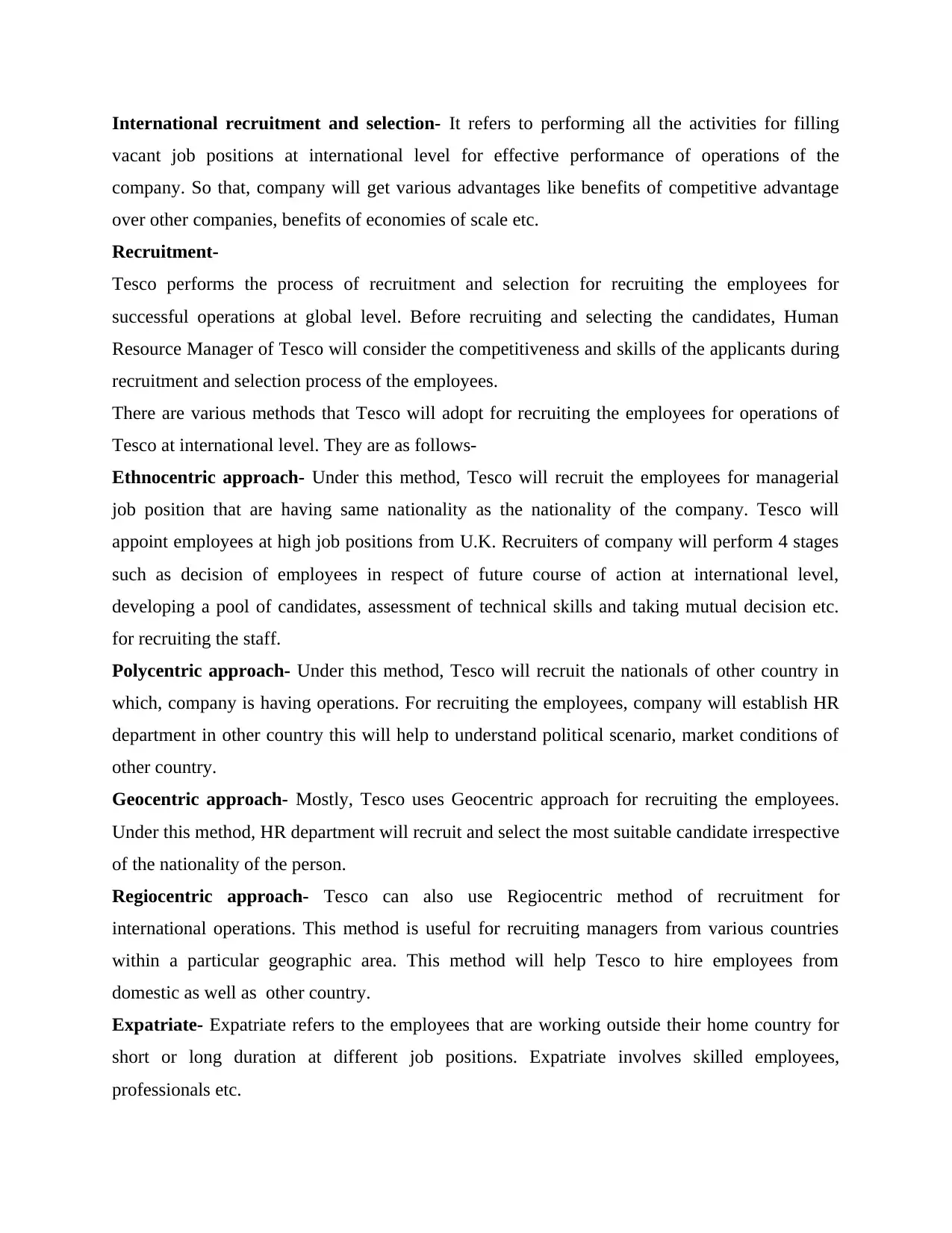
International recruitment and selection- It refers to performing all the activities for filling
vacant job positions at international level for effective performance of operations of the
company. So that, company will get various advantages like benefits of competitive advantage
over other companies, benefits of economies of scale etc.
Recruitment-
Tesco performs the process of recruitment and selection for recruiting the employees for
successful operations at global level. Before recruiting and selecting the candidates, Human
Resource Manager of Tesco will consider the competitiveness and skills of the applicants during
recruitment and selection process of the employees.
There are various methods that Tesco will adopt for recruiting the employees for operations of
Tesco at international level. They are as follows-
Ethnocentric approach- Under this method, Tesco will recruit the employees for managerial
job position that are having same nationality as the nationality of the company. Tesco will
appoint employees at high job positions from U.K. Recruiters of company will perform 4 stages
such as decision of employees in respect of future course of action at international level,
developing a pool of candidates, assessment of technical skills and taking mutual decision etc.
for recruiting the staff.
Polycentric approach- Under this method, Tesco will recruit the nationals of other country in
which, company is having operations. For recruiting the employees, company will establish HR
department in other country this will help to understand political scenario, market conditions of
other country.
Geocentric approach- Mostly, Tesco uses Geocentric approach for recruiting the employees.
Under this method, HR department will recruit and select the most suitable candidate irrespective
of the nationality of the person.
Regiocentric approach- Tesco can also use Regiocentric method of recruitment for
international operations. This method is useful for recruiting managers from various countries
within a particular geographic area. This method will help Tesco to hire employees from
domestic as well as other country.
Expatriate- Expatriate refers to the employees that are working outside their home country for
short or long duration at different job positions. Expatriate involves skilled employees,
professionals etc.
vacant job positions at international level for effective performance of operations of the
company. So that, company will get various advantages like benefits of competitive advantage
over other companies, benefits of economies of scale etc.
Recruitment-
Tesco performs the process of recruitment and selection for recruiting the employees for
successful operations at global level. Before recruiting and selecting the candidates, Human
Resource Manager of Tesco will consider the competitiveness and skills of the applicants during
recruitment and selection process of the employees.
There are various methods that Tesco will adopt for recruiting the employees for operations of
Tesco at international level. They are as follows-
Ethnocentric approach- Under this method, Tesco will recruit the employees for managerial
job position that are having same nationality as the nationality of the company. Tesco will
appoint employees at high job positions from U.K. Recruiters of company will perform 4 stages
such as decision of employees in respect of future course of action at international level,
developing a pool of candidates, assessment of technical skills and taking mutual decision etc.
for recruiting the staff.
Polycentric approach- Under this method, Tesco will recruit the nationals of other country in
which, company is having operations. For recruiting the employees, company will establish HR
department in other country this will help to understand political scenario, market conditions of
other country.
Geocentric approach- Mostly, Tesco uses Geocentric approach for recruiting the employees.
Under this method, HR department will recruit and select the most suitable candidate irrespective
of the nationality of the person.
Regiocentric approach- Tesco can also use Regiocentric method of recruitment for
international operations. This method is useful for recruiting managers from various countries
within a particular geographic area. This method will help Tesco to hire employees from
domestic as well as other country.
Expatriate- Expatriate refers to the employees that are working outside their home country for
short or long duration at different job positions. Expatriate involves skilled employees,
professionals etc.
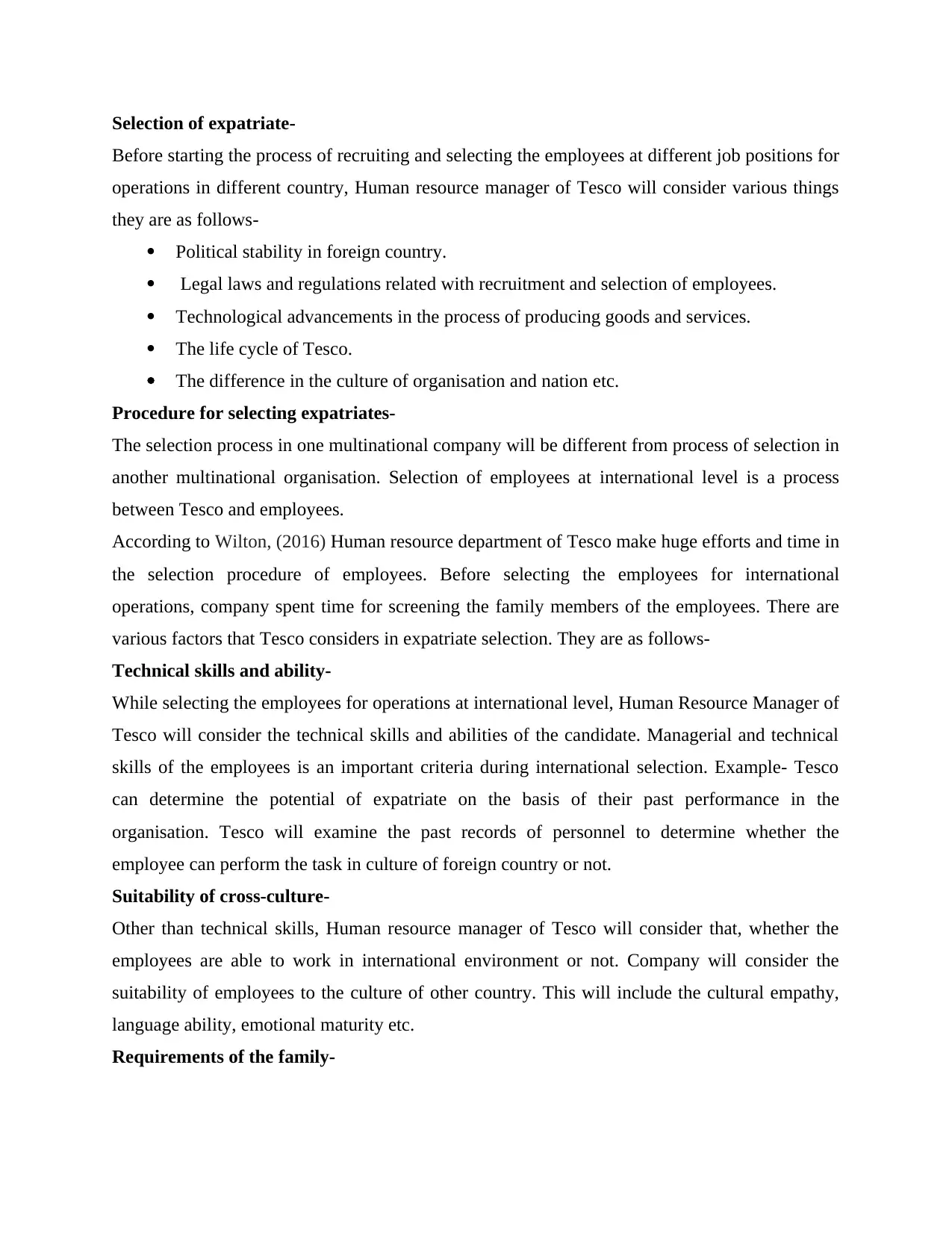
Selection of expatriate-
Before starting the process of recruiting and selecting the employees at different job positions for
operations in different country, Human resource manager of Tesco will consider various things
they are as follows-
Political stability in foreign country.
Legal laws and regulations related with recruitment and selection of employees.
Technological advancements in the process of producing goods and services.
The life cycle of Tesco.
The difference in the culture of organisation and nation etc.
Procedure for selecting expatriates-
The selection process in one multinational company will be different from process of selection in
another multinational organisation. Selection of employees at international level is a process
between Tesco and employees.
According to Wilton, (2016) Human resource department of Tesco make huge efforts and time in
the selection procedure of employees. Before selecting the employees for international
operations, company spent time for screening the family members of the employees. There are
various factors that Tesco considers in expatriate selection. They are as follows-
Technical skills and ability-
While selecting the employees for operations at international level, Human Resource Manager of
Tesco will consider the technical skills and abilities of the candidate. Managerial and technical
skills of the employees is an important criteria during international selection. Example- Tesco
can determine the potential of expatriate on the basis of their past performance in the
organisation. Tesco will examine the past records of personnel to determine whether the
employee can perform the task in culture of foreign country or not.
Suitability of cross-culture-
Other than technical skills, Human resource manager of Tesco will consider that, whether the
employees are able to work in international environment or not. Company will consider the
suitability of employees to the culture of other country. This will include the cultural empathy,
language ability, emotional maturity etc.
Requirements of the family-
Before starting the process of recruiting and selecting the employees at different job positions for
operations in different country, Human resource manager of Tesco will consider various things
they are as follows-
Political stability in foreign country.
Legal laws and regulations related with recruitment and selection of employees.
Technological advancements in the process of producing goods and services.
The life cycle of Tesco.
The difference in the culture of organisation and nation etc.
Procedure for selecting expatriates-
The selection process in one multinational company will be different from process of selection in
another multinational organisation. Selection of employees at international level is a process
between Tesco and employees.
According to Wilton, (2016) Human resource department of Tesco make huge efforts and time in
the selection procedure of employees. Before selecting the employees for international
operations, company spent time for screening the family members of the employees. There are
various factors that Tesco considers in expatriate selection. They are as follows-
Technical skills and ability-
While selecting the employees for operations at international level, Human Resource Manager of
Tesco will consider the technical skills and abilities of the candidate. Managerial and technical
skills of the employees is an important criteria during international selection. Example- Tesco
can determine the potential of expatriate on the basis of their past performance in the
organisation. Tesco will examine the past records of personnel to determine whether the
employee can perform the task in culture of foreign country or not.
Suitability of cross-culture-
Other than technical skills, Human resource manager of Tesco will consider that, whether the
employees are able to work in international environment or not. Company will consider the
suitability of employees to the culture of other country. This will include the cultural empathy,
language ability, emotional maturity etc.
Requirements of the family-
⊘ This is a preview!⊘
Do you want full access?
Subscribe today to unlock all pages.

Trusted by 1+ million students worldwide
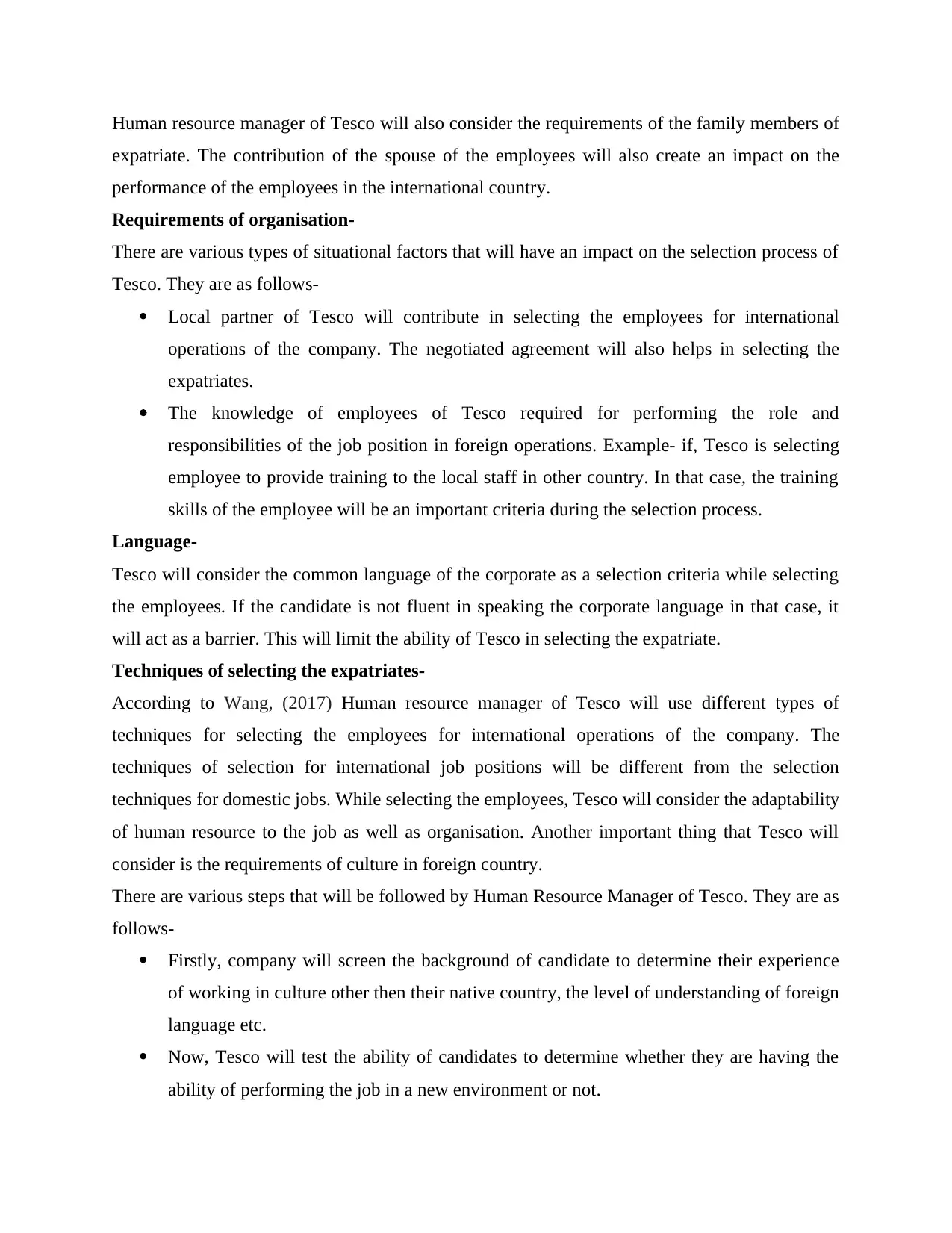
Human resource manager of Tesco will also consider the requirements of the family members of
expatriate. The contribution of the spouse of the employees will also create an impact on the
performance of the employees in the international country.
Requirements of organisation-
There are various types of situational factors that will have an impact on the selection process of
Tesco. They are as follows-
Local partner of Tesco will contribute in selecting the employees for international
operations of the company. The negotiated agreement will also helps in selecting the
expatriates.
The knowledge of employees of Tesco required for performing the role and
responsibilities of the job position in foreign operations. Example- if, Tesco is selecting
employee to provide training to the local staff in other country. In that case, the training
skills of the employee will be an important criteria during the selection process.
Language-
Tesco will consider the common language of the corporate as a selection criteria while selecting
the employees. If the candidate is not fluent in speaking the corporate language in that case, it
will act as a barrier. This will limit the ability of Tesco in selecting the expatriate.
Techniques of selecting the expatriates-
According to Wang, (2017) Human resource manager of Tesco will use different types of
techniques for selecting the employees for international operations of the company. The
techniques of selection for international job positions will be different from the selection
techniques for domestic jobs. While selecting the employees, Tesco will consider the adaptability
of human resource to the job as well as organisation. Another important thing that Tesco will
consider is the requirements of culture in foreign country.
There are various steps that will be followed by Human Resource Manager of Tesco. They are as
follows-
Firstly, company will screen the background of candidate to determine their experience
of working in culture other then their native country, the level of understanding of foreign
language etc.
Now, Tesco will test the ability of candidates to determine whether they are having the
ability of performing the job in a new environment or not.
expatriate. The contribution of the spouse of the employees will also create an impact on the
performance of the employees in the international country.
Requirements of organisation-
There are various types of situational factors that will have an impact on the selection process of
Tesco. They are as follows-
Local partner of Tesco will contribute in selecting the employees for international
operations of the company. The negotiated agreement will also helps in selecting the
expatriates.
The knowledge of employees of Tesco required for performing the role and
responsibilities of the job position in foreign operations. Example- if, Tesco is selecting
employee to provide training to the local staff in other country. In that case, the training
skills of the employee will be an important criteria during the selection process.
Language-
Tesco will consider the common language of the corporate as a selection criteria while selecting
the employees. If the candidate is not fluent in speaking the corporate language in that case, it
will act as a barrier. This will limit the ability of Tesco in selecting the expatriate.
Techniques of selecting the expatriates-
According to Wang, (2017) Human resource manager of Tesco will use different types of
techniques for selecting the employees for international operations of the company. The
techniques of selection for international job positions will be different from the selection
techniques for domestic jobs. While selecting the employees, Tesco will consider the adaptability
of human resource to the job as well as organisation. Another important thing that Tesco will
consider is the requirements of culture in foreign country.
There are various steps that will be followed by Human Resource Manager of Tesco. They are as
follows-
Firstly, company will screen the background of candidate to determine their experience
of working in culture other then their native country, the level of understanding of foreign
language etc.
Now, Tesco will test the ability of candidates to determine whether they are having the
ability of performing the job in a new environment or not.
Paraphrase This Document
Need a fresh take? Get an instant paraphrase of this document with our AI Paraphraser
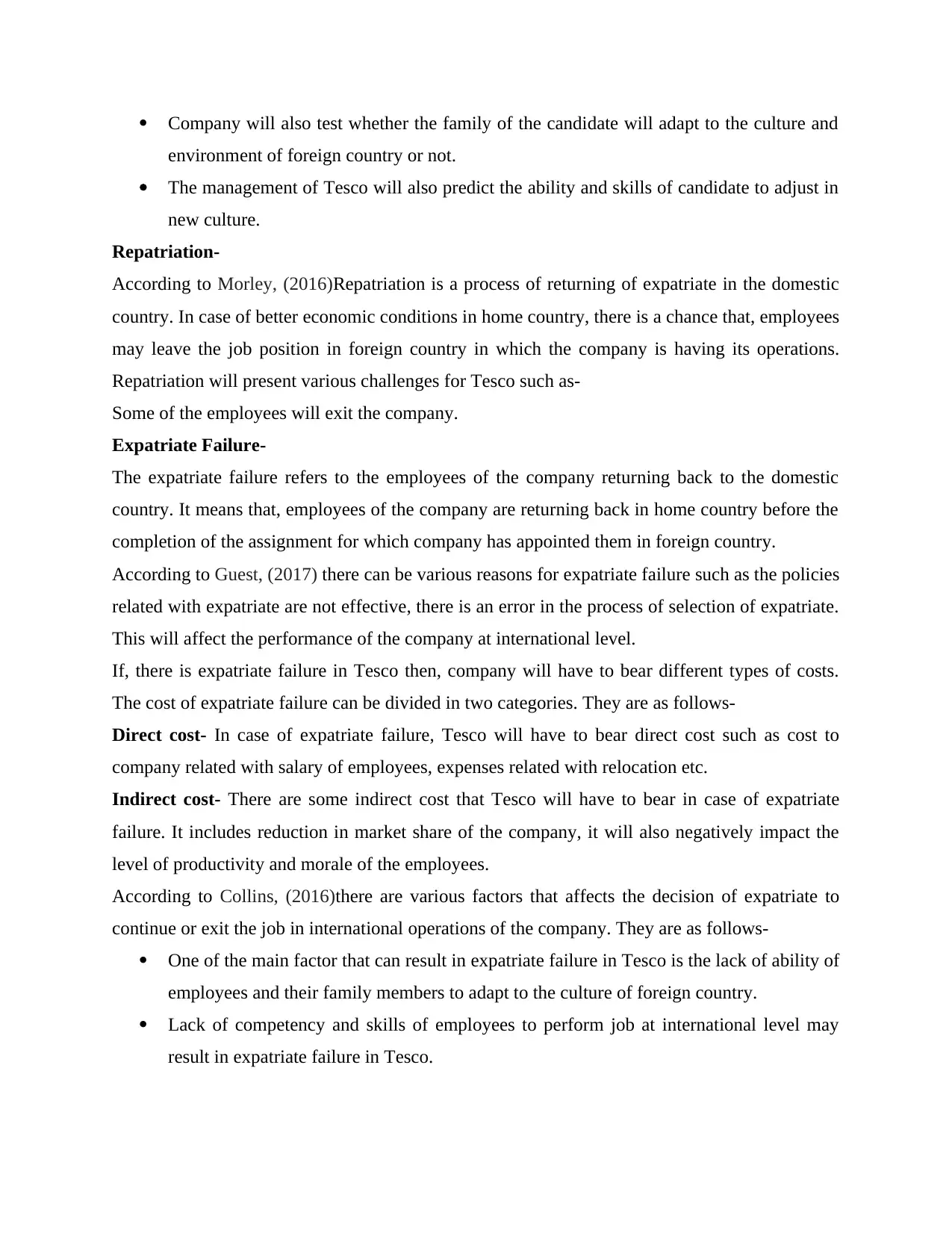
Company will also test whether the family of the candidate will adapt to the culture and
environment of foreign country or not.
The management of Tesco will also predict the ability and skills of candidate to adjust in
new culture.
Repatriation-
According to Morley, (2016)Repatriation is a process of returning of expatriate in the domestic
country. In case of better economic conditions in home country, there is a chance that, employees
may leave the job position in foreign country in which the company is having its operations.
Repatriation will present various challenges for Tesco such as-
Some of the employees will exit the company.
Expatriate Failure-
The expatriate failure refers to the employees of the company returning back to the domestic
country. It means that, employees of the company are returning back in home country before the
completion of the assignment for which company has appointed them in foreign country.
According to Guest, (2017) there can be various reasons for expatriate failure such as the policies
related with expatriate are not effective, there is an error in the process of selection of expatriate.
This will affect the performance of the company at international level.
If, there is expatriate failure in Tesco then, company will have to bear different types of costs.
The cost of expatriate failure can be divided in two categories. They are as follows-
Direct cost- In case of expatriate failure, Tesco will have to bear direct cost such as cost to
company related with salary of employees, expenses related with relocation etc.
Indirect cost- There are some indirect cost that Tesco will have to bear in case of expatriate
failure. It includes reduction in market share of the company, it will also negatively impact the
level of productivity and morale of the employees.
According to Collins, (2016)there are various factors that affects the decision of expatriate to
continue or exit the job in international operations of the company. They are as follows-
One of the main factor that can result in expatriate failure in Tesco is the lack of ability of
employees and their family members to adapt to the culture of foreign country.
Lack of competency and skills of employees to perform job at international level may
result in expatriate failure in Tesco.
environment of foreign country or not.
The management of Tesco will also predict the ability and skills of candidate to adjust in
new culture.
Repatriation-
According to Morley, (2016)Repatriation is a process of returning of expatriate in the domestic
country. In case of better economic conditions in home country, there is a chance that, employees
may leave the job position in foreign country in which the company is having its operations.
Repatriation will present various challenges for Tesco such as-
Some of the employees will exit the company.
Expatriate Failure-
The expatriate failure refers to the employees of the company returning back to the domestic
country. It means that, employees of the company are returning back in home country before the
completion of the assignment for which company has appointed them in foreign country.
According to Guest, (2017) there can be various reasons for expatriate failure such as the policies
related with expatriate are not effective, there is an error in the process of selection of expatriate.
This will affect the performance of the company at international level.
If, there is expatriate failure in Tesco then, company will have to bear different types of costs.
The cost of expatriate failure can be divided in two categories. They are as follows-
Direct cost- In case of expatriate failure, Tesco will have to bear direct cost such as cost to
company related with salary of employees, expenses related with relocation etc.
Indirect cost- There are some indirect cost that Tesco will have to bear in case of expatriate
failure. It includes reduction in market share of the company, it will also negatively impact the
level of productivity and morale of the employees.
According to Collins, (2016)there are various factors that affects the decision of expatriate to
continue or exit the job in international operations of the company. They are as follows-
One of the main factor that can result in expatriate failure in Tesco is the lack of ability of
employees and their family members to adapt to the culture of foreign country.
Lack of competency and skills of employees to perform job at international level may
result in expatriate failure in Tesco.
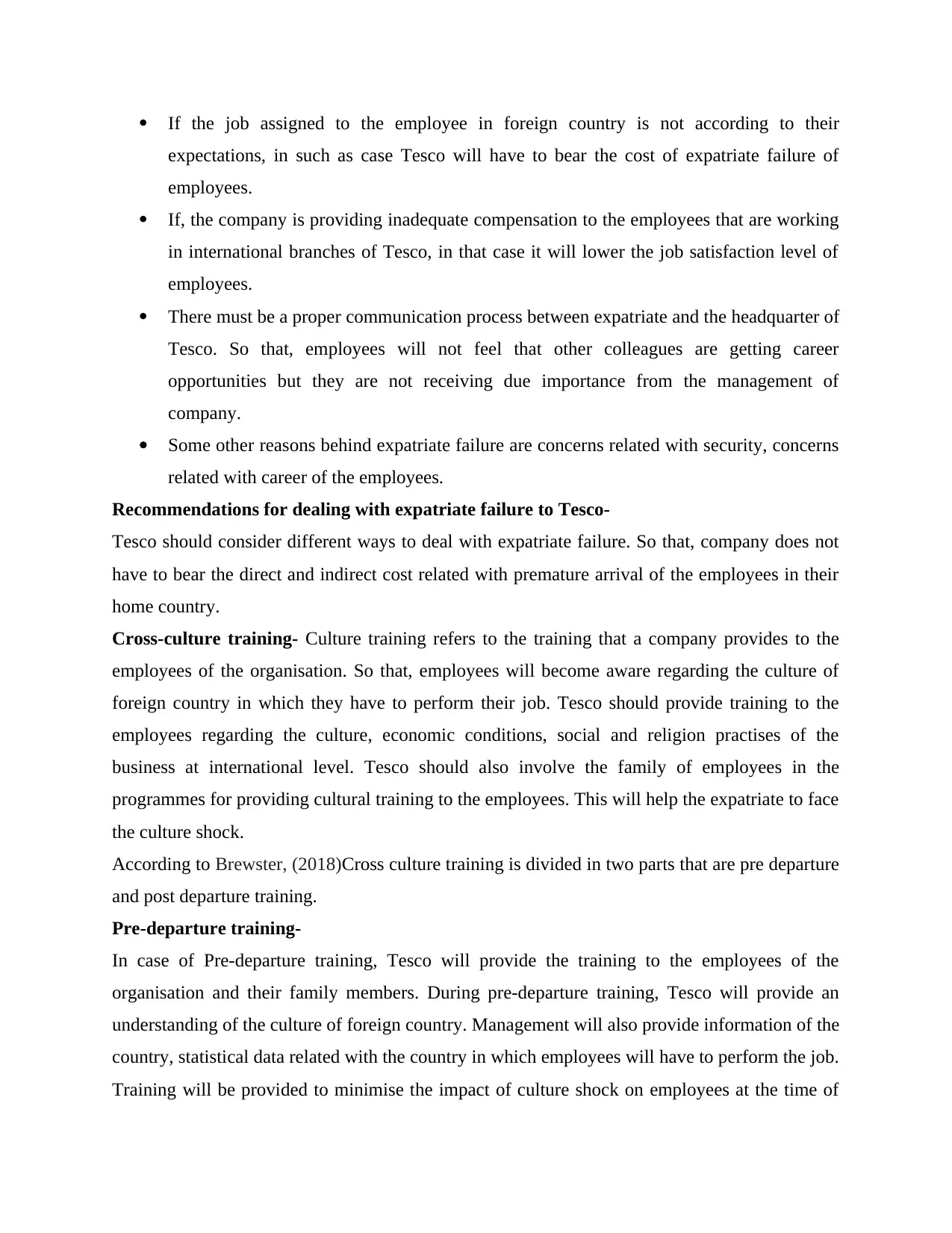
If the job assigned to the employee in foreign country is not according to their
expectations, in such as case Tesco will have to bear the cost of expatriate failure of
employees.
If, the company is providing inadequate compensation to the employees that are working
in international branches of Tesco, in that case it will lower the job satisfaction level of
employees.
There must be a proper communication process between expatriate and the headquarter of
Tesco. So that, employees will not feel that other colleagues are getting career
opportunities but they are not receiving due importance from the management of
company.
Some other reasons behind expatriate failure are concerns related with security, concerns
related with career of the employees.
Recommendations for dealing with expatriate failure to Tesco-
Tesco should consider different ways to deal with expatriate failure. So that, company does not
have to bear the direct and indirect cost related with premature arrival of the employees in their
home country.
Cross-culture training- Culture training refers to the training that a company provides to the
employees of the organisation. So that, employees will become aware regarding the culture of
foreign country in which they have to perform their job. Tesco should provide training to the
employees regarding the culture, economic conditions, social and religion practises of the
business at international level. Tesco should also involve the family of employees in the
programmes for providing cultural training to the employees. This will help the expatriate to face
the culture shock.
According to Brewster, (2018)Cross culture training is divided in two parts that are pre departure
and post departure training.
Pre-departure training-
In case of Pre-departure training, Tesco will provide the training to the employees of the
organisation and their family members. During pre-departure training, Tesco will provide an
understanding of the culture of foreign country. Management will also provide information of the
country, statistical data related with the country in which employees will have to perform the job.
Training will be provided to minimise the impact of culture shock on employees at the time of
expectations, in such as case Tesco will have to bear the cost of expatriate failure of
employees.
If, the company is providing inadequate compensation to the employees that are working
in international branches of Tesco, in that case it will lower the job satisfaction level of
employees.
There must be a proper communication process between expatriate and the headquarter of
Tesco. So that, employees will not feel that other colleagues are getting career
opportunities but they are not receiving due importance from the management of
company.
Some other reasons behind expatriate failure are concerns related with security, concerns
related with career of the employees.
Recommendations for dealing with expatriate failure to Tesco-
Tesco should consider different ways to deal with expatriate failure. So that, company does not
have to bear the direct and indirect cost related with premature arrival of the employees in their
home country.
Cross-culture training- Culture training refers to the training that a company provides to the
employees of the organisation. So that, employees will become aware regarding the culture of
foreign country in which they have to perform their job. Tesco should provide training to the
employees regarding the culture, economic conditions, social and religion practises of the
business at international level. Tesco should also involve the family of employees in the
programmes for providing cultural training to the employees. This will help the expatriate to face
the culture shock.
According to Brewster, (2018)Cross culture training is divided in two parts that are pre departure
and post departure training.
Pre-departure training-
In case of Pre-departure training, Tesco will provide the training to the employees of the
organisation and their family members. During pre-departure training, Tesco will provide an
understanding of the culture of foreign country. Management will also provide information of the
country, statistical data related with the country in which employees will have to perform the job.
Training will be provided to minimise the impact of culture shock on employees at the time of
⊘ This is a preview!⊘
Do you want full access?
Subscribe today to unlock all pages.

Trusted by 1+ million students worldwide
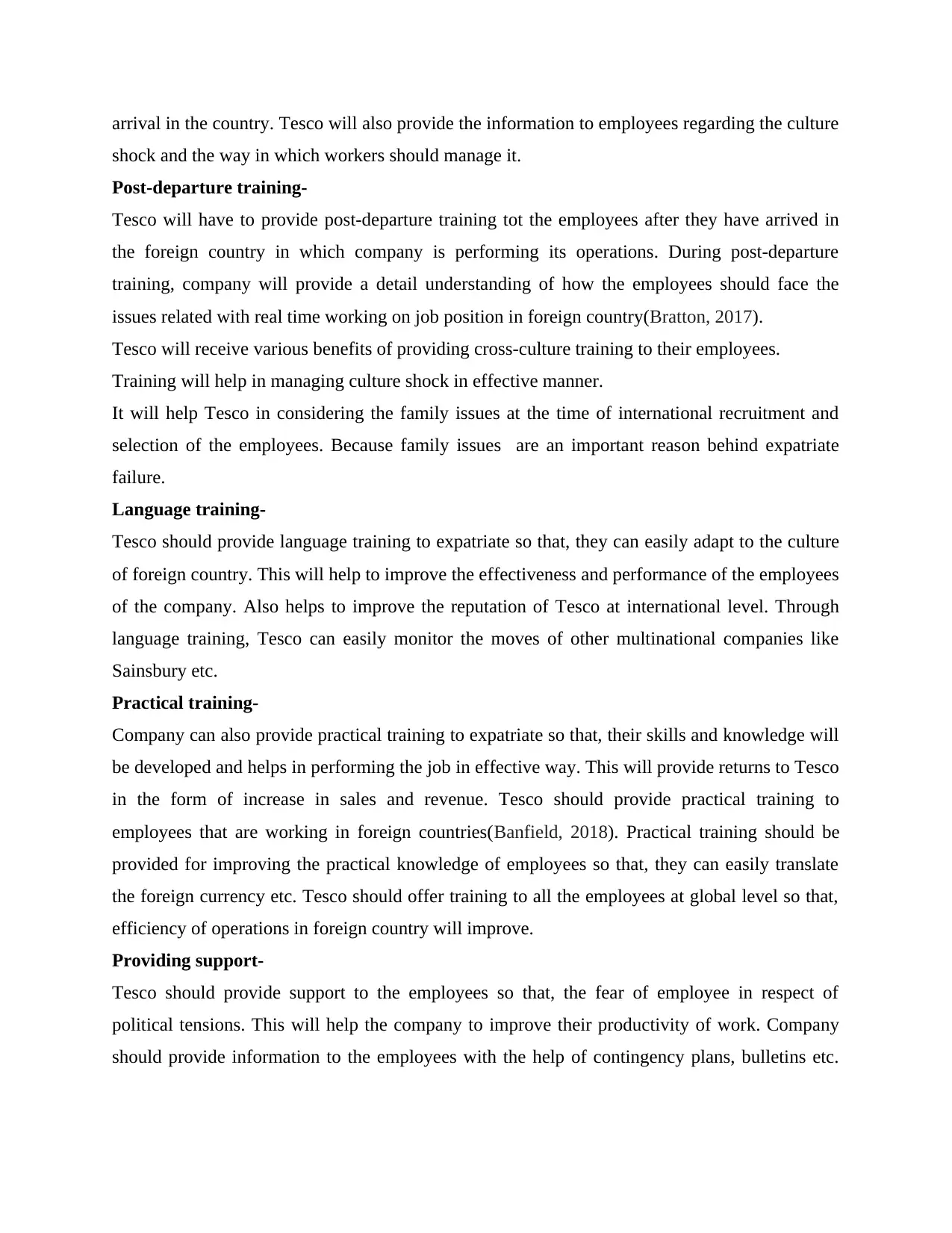
arrival in the country. Tesco will also provide the information to employees regarding the culture
shock and the way in which workers should manage it.
Post-departure training-
Tesco will have to provide post-departure training tot the employees after they have arrived in
the foreign country in which company is performing its operations. During post-departure
training, company will provide a detail understanding of how the employees should face the
issues related with real time working on job position in foreign country(Bratton, 2017).
Tesco will receive various benefits of providing cross-culture training to their employees.
Training will help in managing culture shock in effective manner.
It will help Tesco in considering the family issues at the time of international recruitment and
selection of the employees. Because family issues are an important reason behind expatriate
failure.
Language training-
Tesco should provide language training to expatriate so that, they can easily adapt to the culture
of foreign country. This will help to improve the effectiveness and performance of the employees
of the company. Also helps to improve the reputation of Tesco at international level. Through
language training, Tesco can easily monitor the moves of other multinational companies like
Sainsbury etc.
Practical training-
Company can also provide practical training to expatriate so that, their skills and knowledge will
be developed and helps in performing the job in effective way. This will provide returns to Tesco
in the form of increase in sales and revenue. Tesco should provide practical training to
employees that are working in foreign countries(Banfield, 2018). Practical training should be
provided for improving the practical knowledge of employees so that, they can easily translate
the foreign currency etc. Tesco should offer training to all the employees at global level so that,
efficiency of operations in foreign country will improve.
Providing support-
Tesco should provide support to the employees so that, the fear of employee in respect of
political tensions. This will help the company to improve their productivity of work. Company
should provide information to the employees with the help of contingency plans, bulletins etc.
shock and the way in which workers should manage it.
Post-departure training-
Tesco will have to provide post-departure training tot the employees after they have arrived in
the foreign country in which company is performing its operations. During post-departure
training, company will provide a detail understanding of how the employees should face the
issues related with real time working on job position in foreign country(Bratton, 2017).
Tesco will receive various benefits of providing cross-culture training to their employees.
Training will help in managing culture shock in effective manner.
It will help Tesco in considering the family issues at the time of international recruitment and
selection of the employees. Because family issues are an important reason behind expatriate
failure.
Language training-
Tesco should provide language training to expatriate so that, they can easily adapt to the culture
of foreign country. This will help to improve the effectiveness and performance of the employees
of the company. Also helps to improve the reputation of Tesco at international level. Through
language training, Tesco can easily monitor the moves of other multinational companies like
Sainsbury etc.
Practical training-
Company can also provide practical training to expatriate so that, their skills and knowledge will
be developed and helps in performing the job in effective way. This will provide returns to Tesco
in the form of increase in sales and revenue. Tesco should provide practical training to
employees that are working in foreign countries(Banfield, 2018). Practical training should be
provided for improving the practical knowledge of employees so that, they can easily translate
the foreign currency etc. Tesco should offer training to all the employees at global level so that,
efficiency of operations in foreign country will improve.
Providing support-
Tesco should provide support to the employees so that, the fear of employee in respect of
political tensions. This will help the company to improve their productivity of work. Company
should provide information to the employees with the help of contingency plans, bulletins etc.
Paraphrase This Document
Need a fresh take? Get an instant paraphrase of this document with our AI Paraphraser
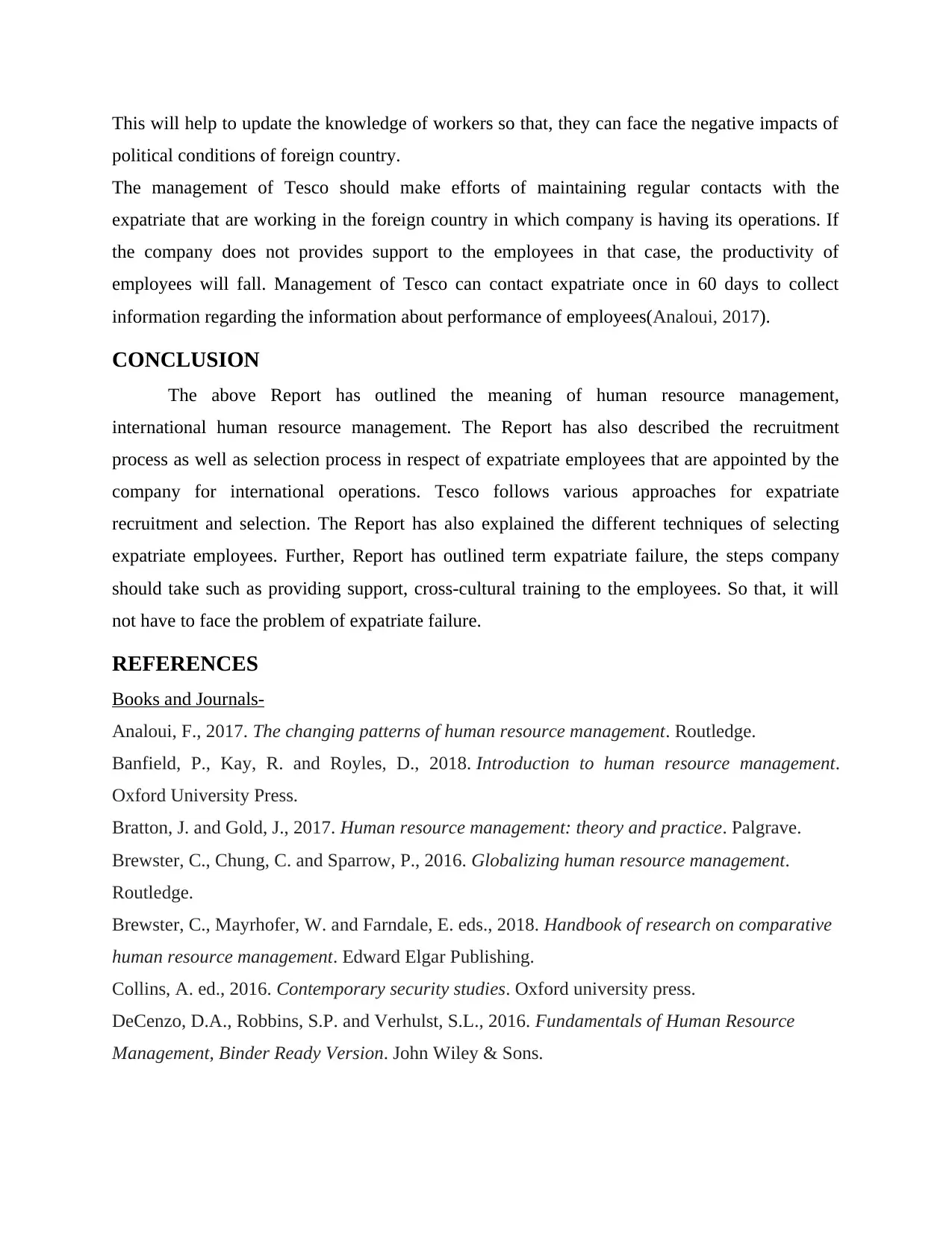
This will help to update the knowledge of workers so that, they can face the negative impacts of
political conditions of foreign country.
The management of Tesco should make efforts of maintaining regular contacts with the
expatriate that are working in the foreign country in which company is having its operations. If
the company does not provides support to the employees in that case, the productivity of
employees will fall. Management of Tesco can contact expatriate once in 60 days to collect
information regarding the information about performance of employees(Analoui, 2017).
CONCLUSION
The above Report has outlined the meaning of human resource management,
international human resource management. The Report has also described the recruitment
process as well as selection process in respect of expatriate employees that are appointed by the
company for international operations. Tesco follows various approaches for expatriate
recruitment and selection. The Report has also explained the different techniques of selecting
expatriate employees. Further, Report has outlined term expatriate failure, the steps company
should take such as providing support, cross-cultural training to the employees. So that, it will
not have to face the problem of expatriate failure.
REFERENCES
Books and Journals-
Analoui, F., 2017. The changing patterns of human resource management. Routledge.
Banfield, P., Kay, R. and Royles, D., 2018. Introduction to human resource management.
Oxford University Press.
Bratton, J. and Gold, J., 2017. Human resource management: theory and practice. Palgrave.
Brewster, C., Chung, C. and Sparrow, P., 2016. Globalizing human resource management.
Routledge.
Brewster, C., Mayrhofer, W. and Farndale, E. eds., 2018. Handbook of research on comparative
human resource management. Edward Elgar Publishing.
Collins, A. ed., 2016. Contemporary security studies. Oxford university press.
DeCenzo, D.A., Robbins, S.P. and Verhulst, S.L., 2016. Fundamentals of Human Resource
Management, Binder Ready Version. John Wiley & Sons.
political conditions of foreign country.
The management of Tesco should make efforts of maintaining regular contacts with the
expatriate that are working in the foreign country in which company is having its operations. If
the company does not provides support to the employees in that case, the productivity of
employees will fall. Management of Tesco can contact expatriate once in 60 days to collect
information regarding the information about performance of employees(Analoui, 2017).
CONCLUSION
The above Report has outlined the meaning of human resource management,
international human resource management. The Report has also described the recruitment
process as well as selection process in respect of expatriate employees that are appointed by the
company for international operations. Tesco follows various approaches for expatriate
recruitment and selection. The Report has also explained the different techniques of selecting
expatriate employees. Further, Report has outlined term expatriate failure, the steps company
should take such as providing support, cross-cultural training to the employees. So that, it will
not have to face the problem of expatriate failure.
REFERENCES
Books and Journals-
Analoui, F., 2017. The changing patterns of human resource management. Routledge.
Banfield, P., Kay, R. and Royles, D., 2018. Introduction to human resource management.
Oxford University Press.
Bratton, J. and Gold, J., 2017. Human resource management: theory and practice. Palgrave.
Brewster, C., Chung, C. and Sparrow, P., 2016. Globalizing human resource management.
Routledge.
Brewster, C., Mayrhofer, W. and Farndale, E. eds., 2018. Handbook of research on comparative
human resource management. Edward Elgar Publishing.
Collins, A. ed., 2016. Contemporary security studies. Oxford university press.
DeCenzo, D.A., Robbins, S.P. and Verhulst, S.L., 2016. Fundamentals of Human Resource
Management, Binder Ready Version. John Wiley & Sons.
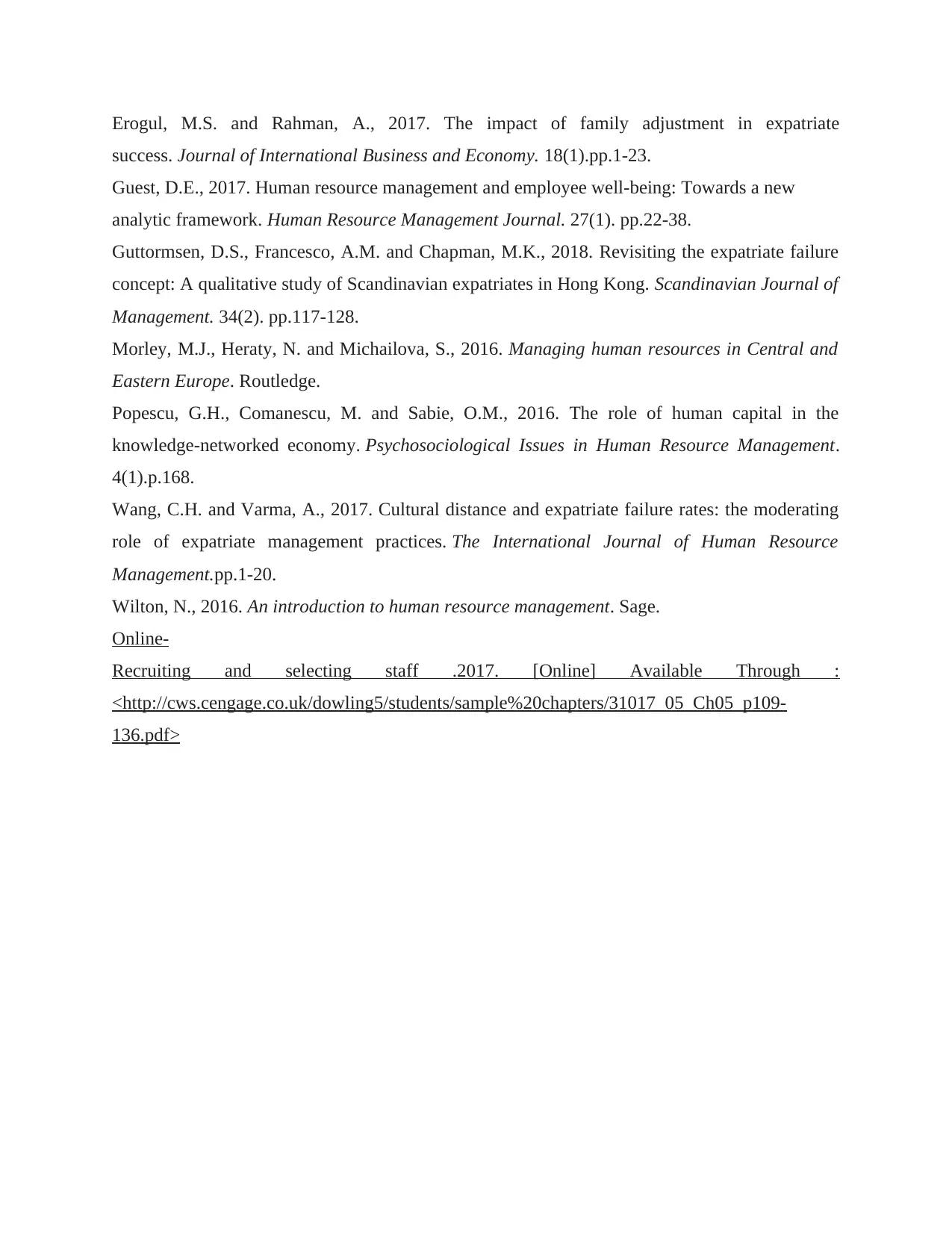
Erogul, M.S. and Rahman, A., 2017. The impact of family adjustment in expatriate
success. Journal of International Business and Economy. 18(1).pp.1-23.
Guest, D.E., 2017. Human resource management and employee well‐being: Towards a new
analytic framework. Human Resource Management Journal. 27(1). pp.22-38.
Guttormsen, D.S., Francesco, A.M. and Chapman, M.K., 2018. Revisiting the expatriate failure
concept: A qualitative study of Scandinavian expatriates in Hong Kong. Scandinavian Journal of
Management. 34(2). pp.117-128.
Morley, M.J., Heraty, N. and Michailova, S., 2016. Managing human resources in Central and
Eastern Europe. Routledge.
Popescu, G.H., Comanescu, M. and Sabie, O.M., 2016. The role of human capital in the
knowledge-networked economy. Psychosociological Issues in Human Resource Management.
4(1).p.168.
Wang, C.H. and Varma, A., 2017. Cultural distance and expatriate failure rates: the moderating
role of expatriate management practices. The International Journal of Human Resource
Management.pp.1-20.
Wilton, N., 2016. An introduction to human resource management. Sage.
Online-
Recruiting and selecting staff .2017. [Online] Available Through :
<http://cws.cengage.co.uk/dowling5/students/sample%20chapters/31017_05_Ch05_p109-
136.pdf>
success. Journal of International Business and Economy. 18(1).pp.1-23.
Guest, D.E., 2017. Human resource management and employee well‐being: Towards a new
analytic framework. Human Resource Management Journal. 27(1). pp.22-38.
Guttormsen, D.S., Francesco, A.M. and Chapman, M.K., 2018. Revisiting the expatriate failure
concept: A qualitative study of Scandinavian expatriates in Hong Kong. Scandinavian Journal of
Management. 34(2). pp.117-128.
Morley, M.J., Heraty, N. and Michailova, S., 2016. Managing human resources in Central and
Eastern Europe. Routledge.
Popescu, G.H., Comanescu, M. and Sabie, O.M., 2016. The role of human capital in the
knowledge-networked economy. Psychosociological Issues in Human Resource Management.
4(1).p.168.
Wang, C.H. and Varma, A., 2017. Cultural distance and expatriate failure rates: the moderating
role of expatriate management practices. The International Journal of Human Resource
Management.pp.1-20.
Wilton, N., 2016. An introduction to human resource management. Sage.
Online-
Recruiting and selecting staff .2017. [Online] Available Through :
<http://cws.cengage.co.uk/dowling5/students/sample%20chapters/31017_05_Ch05_p109-
136.pdf>
⊘ This is a preview!⊘
Do you want full access?
Subscribe today to unlock all pages.

Trusted by 1+ million students worldwide
1 out of 12
Related Documents
Your All-in-One AI-Powered Toolkit for Academic Success.
+13062052269
info@desklib.com
Available 24*7 on WhatsApp / Email
![[object Object]](/_next/static/media/star-bottom.7253800d.svg)
Unlock your academic potential
Copyright © 2020–2026 A2Z Services. All Rights Reserved. Developed and managed by ZUCOL.




